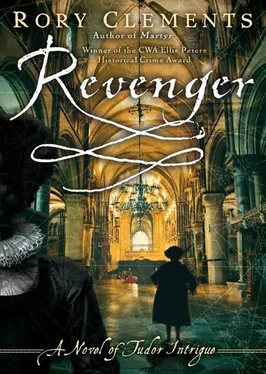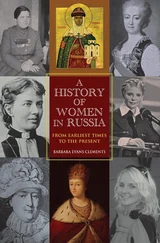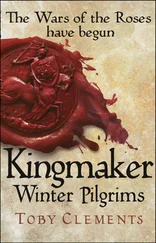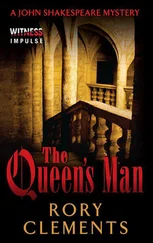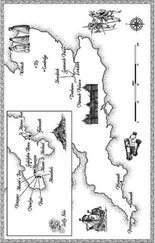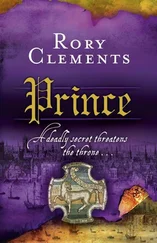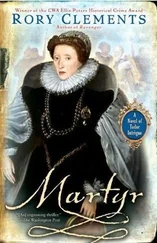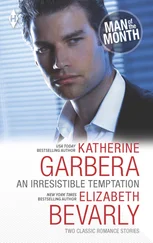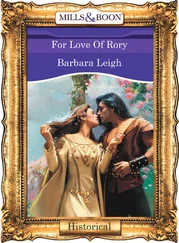“How, then, Sir Robert, does this bring you to your conclusion regarding my lord of Essex?”
“Let me tell you a little about Robert Devereux, the Earl of Essex. He is a strong man, valiant in war, formidable at the tilt, charming and amusing. That is why the Queen loves him. That is why so many cluster around him. When a strong man rises up in times like these, he becomes a lodestone that draws weaker men in. Especially when, as in France last year, he personally knights twenty-four of his men, much to the dismay and fury of his sovereign. Why does he do such a thing unless he would build up a power base of men who owe him everything?”
“But he is not of the blood royal,” Shakespeare pointed out. “The Scotch king, James VI, must surely have a prior claim. The young Lady Arbella Stuart, too. Even the Countess of Derby or her son Lord Strange…”
Cecil interrupted. “Many do not want a Scotchman as their king. The Countess of Derby is long in the tooth-or what few she has left-and has no support. Her son is tainted with suspicion of Catholic sympathies. There are those who believe it must, then, be Arbella. She is English-born and has youth and, some say, beauty to commend her.”
“Then Arbella must look most likely to succeed.”
“What would you say if I were to tell you that she is being wooed, secretly, by Essex?”
“I would say that my lord of Essex has a wife. He is married to Frances, daughter of Sir Francis Walsingham and widow of Sir Philip Sidney.”
Cecil stood and signaled to a flunky to take their empty glasses. He began to walk again through the gardens, basking in the dappled sunshine and warm air. Shakespeare followed him, studying him intently. Never since his days working for Walsingham had he met a man so utterly in command of himself and his surroundings. It seemed almost that he did not blink without first weighing up the consequences. He would be a hard man to warm to, but an easy man to respect.
“You are not so innocent, Mr. Shakespeare. You did not work for Mr. Secretary for nine years without learning something about the dark heart of man. Do you think this Devereux family is one that cares for such legal niceties as a mere marriage contract? When Essex’s mother, the regal Lettice, married Leicester, was he not already wed to Lady Douglass Sheffield? He tried to claim it was some false marriage, but no one believed that. And what of poor Amy Robsart, Leicester’s first wife, who had a most unfortunate-yet convenient-fall down the stairs to her death while her husband was trying to win himself a queen for his wife? What is one little life against a matter so great? What is a little fall down the stairs? It cured all poor Amy Robsart’s ills and might have won Leicester the crown. Do you think the Countess of Essex will fare better?”
Shakespeare was thinking fast. He was astonished that Cecil should reveal his suspicions in this way.
“A small thing like a wife is but a minor inconvenience to such men, Mr. Shakespeare.” Cecil’s face was hard-set now. This was no jest. “Let me tell you more about my lord of Essex.”
They approached a wooden bench that stood against a wall of the house beneath a peach tree. Cecil gestured for Shakespeare to sit. Sunlight glanced off his shoulder. Cecil perched himself on the arm of the bench, one foot touching the ground.
“I have known my lord of Essex since we were boys,” Cecil said. “He was my father’s ward after his own father died. We were schooled and brought up together. We never liked each other. Though I was three years the elder, he was always bigger than me and greater at the manly sports. On the tennis court, he was exquisite in his grace and skill, while I could only watch and wonder. And, of course, he taunted me for my physical weakness, as boys will.
“But I also knew that I had advantages over him. He could never hope to match me at the classics, at the languages of our continental neighbors, at law and the study of governance. He lacked rigor. When I was fourteen and he was eleven, he challenged me to a duel. He had made some foul remark about my crooked back being a result of my mother conceiving me at the time of her flowers, and I responded that at least my mother had not poisoned my father. I should not have spoken to him thus, but it was said in the heat of the moment. I tried to laugh off his challenge of a duel, but he insisted and said that it was my right to choose the weapons and the battleground. And so I said, ‘If that is the way it is to be, then I choose chess pieces as my weapons and the squared board as the battleground.’ He became angry, very angry, and said I was a coward. I told him that, clearly, it was he who was afraid to take up my challenge, and I went off to fetch the chess pieces and board. We played and I was beating him with considerable ease. He went away and said he would be back anon. He returned with a morgenstern. Are you familiar with a morgenstern, Mr. Shakespeare?”
“Of course I know of them. I have never seen one.”
“They are maces, much favored by the Habsburg troops. The word ‘morgenstern’ means ‘morning star,’ for they have a heavy iron head, spiked like a star. My lord of Essex took his morgenstern and swung it with all his great might down onto the chessboard, which was a fine piece, cut from marble and brought from Verona. The board was smashed into fragments, as were many of the playing pieces. He then kicked the rubble away with his soft-shod foot and said to me, ‘Checkmate. That is what I shall do to you one day, Robin Crookback.’ ”
Cecil paused for effect. Shakespeare knew that there was no love between the two men, but he had no idea it stemmed from such an episode.
“I spotted something in my lord of Essex that day, some dark ambition that even he could not understand, let alone control.”
Again, Shakespeare said nothing.
“My father has seen it, too, Mr. Shakespeare. The Queen will not see it, however. She takes pleasure in the attentions my lord of Essex pays her and is beguiled by him. He swoons and affects a swain’s devotion to his maiden love, his Queen. So we must protect her without her knowledge.”
“Protect her from what exactly?”
“His dark desire. My lord of Essex would be king. And those around him-his family, his friends-would crown him. Arbella, though she does not know it, is the route, the conduit, to that crown.”
“You have information?”
Cecil paused. “Mr. Shakespeare, please,” he said evenly, “do not ask me to reveal the source of my intelligence. If I were to tell you such a thing, how would you ever trust me?”
It was a good point. But Cecil clearly had an informant operating within the Essex circle. Shakespeare tried to recall all he knew of Arbella Stuart, the princess with England’s future weighing heavily on her tender young shoulders. Great-granddaughter of Henry VIII’s elder sister, Margaret, she was the child of the scandalous marriage of the young Charles Stuart and Elizabeth Cavendish (he was nineteen, she twenty); the match was illicit because the Queen had not licensed it, and she erupted in one of her customary furies on hearing of it. For Charles was in line of succession to both the Scots and English thrones, and such a man might never marry without his sovereign’s consent.
So Arbella was born into trouble, and it had followed her like a hungry dog ever since. Her father died of consumption within a year of her birth, and her mother died of a sudden illness five years later, leaving the little girl an orphan. Her maternal grandmother, the Countess of Shrewsbury-better known as Bess of Hardwick-took on the care of the six-year-old. She brought her up a princess, insisting she be served by kneeling retainers and addressed as “Highness.”
Читать дальше
